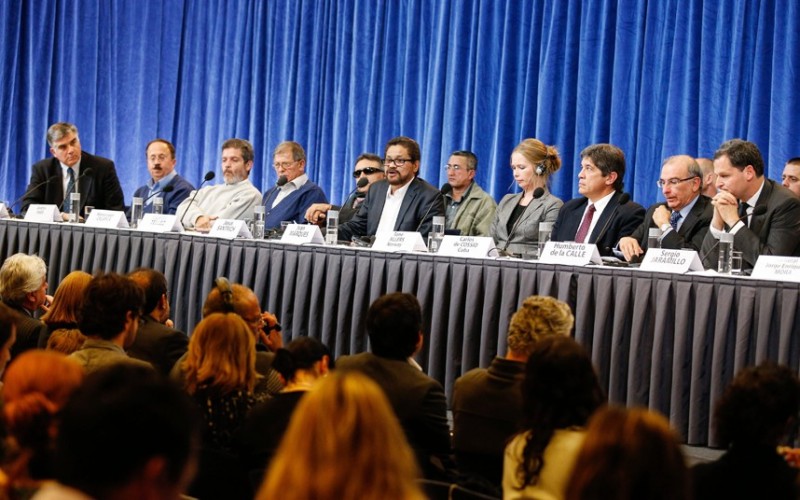Both ends of the negotiating table in Colombia will have to persuade their own ranks to prevent further clashes and keep negotiations afloat. Peace negotiations will likely delay any prospective treaty to 2016.

Recent armed confrontations in western Colombia cast shadows of doubt over the fate of the peace process. Negotiations in La Havana are under serious strain due to public outrage. Both the Santos administration and FARC’s Secretariat are running out of time to make this round of peace talks a definitive one.
A shaken truce
Domestic and international pressure built up after recent incidents put intense stress on the peace negotiations held in Cuba. On April 14th, a battle between the 29th mobile column ‘Apolo’ of the Colombian Army and FARC fighters erupted in the heights of Buenos Aires, a town in the western region of Cauca.
Eleven army soldiers were reported dead in the clashes. Elements of the Miller Perdomo’s Fourth commission, belonging to FARC’s Alfonso Cano Western Bloc, are believed to have been involved in the episode.
Following the exchange, FARC and representatives of the government cross-fired accusations over responsibilities for the episode, ranging from the depiction of a rebel ambush to one of an army offensive. Under any of these circumstances, the progress achieved through negotiations has been seriously jeopardized.
The incident entailed the biggest seatback of mutual trust since December 20th, when FARC self-imposed a unilateral ceasefire. Taking the heat, President Juan Manuel Santos ordered to resume air-strikes over FARC camps. Such a decision meant rolling back his March 10th resolution to halt the airstrikes as a goodwill concession to FARC upon the progress of the peace talks.
FARC’s December truce had the intention of restoring confidence in the negotiations after a crisis that erupted with the capture of General Alzate on November 16th, which was conducted by the 34th Front. Yet, the truce has been deteriorating since March 9th, with the assassination of alias ‘El Becerro’, commander of the 57th Front and one of FARC’s key figures in the western region.
It is no coincidence that Cauca, along with Choco, Hulia, Nariño, and Putumayo, are regions of Western Colombia where most of late incidents occurred. The Western corner of Colombia has been the most difficult area for both parties to avoid direct confrontations, and is likely to continue that way for the foreseeable future.
What’s at stake?
Colombia’s internal conflict is the most enduring armed dispute in the Western Hemisphere, dating back to 1964. With over 50 years of armed fighting, the peace treaties have remained elusive, with several failed negotiations during the 80’s and 90’s. Nevertheless, the current peace process held in Cuba and mediated by Norway has been the most successful thus far.
Santos is under increasing need to show results, since the longer the negotiations extend over time, the more distant peace lies. Losing momentum could undermine the likelihood of a successful pact. The Colombian Constitution mandates that peace treaties cannot be signed by executive power alone, but must also be countersigned by a public referendum.
Santos had the initial intention of striking a peace agreement early this year, so to validate it publicly during the district elections of October 25th. However, his ambitious strategy is likely to politically backfire and help opposition leaders close to former President Uribe instead. This outcome would allow them to gain seats, ultimately lowering the likelihood of a successful peace deal.
FARC feel the urgency as well, and despite the ideological affinity shared with Cuba, host of the peace talks, there is a tacit deadline. Cuba, acting as a peace broker, cannot take the responsibility to host the rebels beyond 2016, particularly amidst the fast-paced diplomatic thaw with the United States. The U.S. State Department has issued arrest warrants against many FARC top negotiators.
Negotiations will not derail but delay
Both negotiating parties will engage in damage-control, trying to persuade their own ranks to hold steadfast to the peace agenda. Despite the scale of the quarrel and the reinstitution of airstrikes, advancing with the negotiations still is the safest bet for both sides.
“Hope has been fractured, but when hope is broken, it is time for faith…all of our energy should be focused on achieving an end to the conflict,” said Humberto de la Calle, chief negotiator for the Colombian Government, who eloquently described the fragile status of the negotiations.
Meanwhile, FARC delegates in Cuba have requested that the Colombian Authorities not re-escalate after the incident, and announced that they will keep their ceasefire in place. Consequently, Santos is facing an uncomfortable dilemma, having to bear the weight of criticism without applying further military pressure against FARC out of fear of defection.
But with public pressure building up and patience running scarce, Santos will have to take a more decisive stance and show more resolution before the guerrillas. Aiming to grant more concrete results, Santos will try to establish a clear deadline for the negotiations. However, recent facts suggest that a peace treaty will not be achieved this year as the Government envisioned.
Since a referendum for countersigning a peace treaty must be revisited by the Constitutional Court, it will be impossible to ratify any prospective deal by a general vote before 2016.
sourche: http://globalriskinsights.com/2015/04/shaken-truce-in-colombia-casts-doubt-over-peace-negotiations/
Δεν υπάρχουν σχόλια:
Δημοσίευση σχολίου